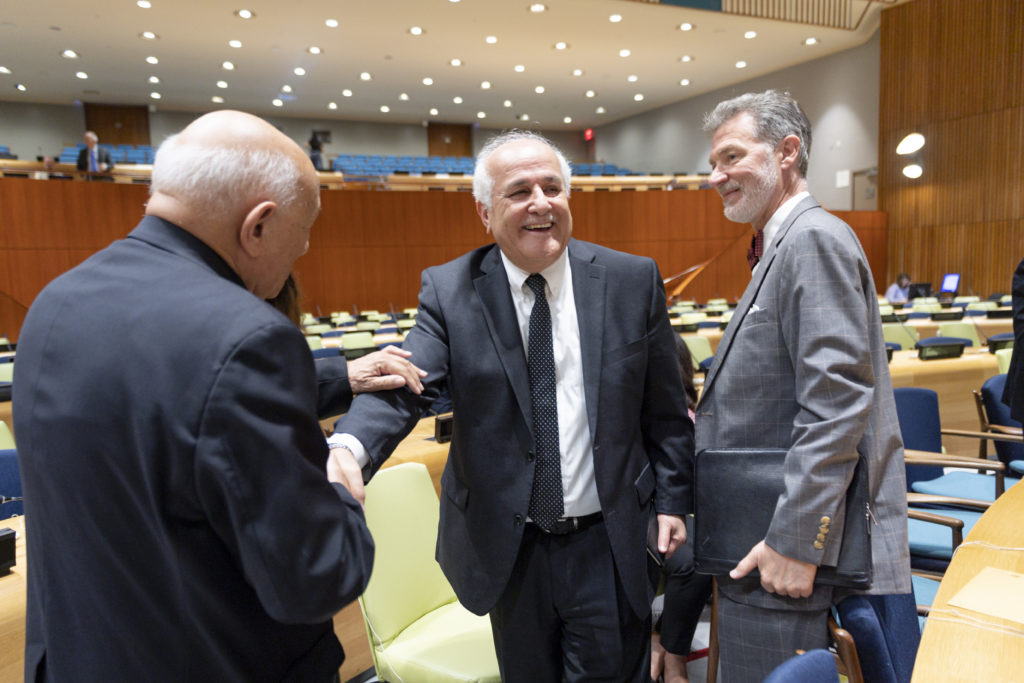FRESH AIR
Australia at the table as UN discusses Palestinian funding
October 10, 2019 | Naomi Levin

Australia was represented at a United Nations committee meeting that called for more funding for the United Nations Relief and Works Agency for Palestine Refugees (UNRWA).
It comes at a time when UNRWA’s senior leadership are under investigation for possible financial misconduct, corruption and bullying. Some donor-states have suspended funding to UNRWA pending the outcome of the investigation, although Australia is not one of them.
AIJAC can confirm that a senior official from Australia’s Department of Foreign Affairs and Trade attended the meeting of the UN Ad Hoc Liaison Committee in New York.
The Ad Hoc Liaison Committee meets twice yearly to coordinate policy towards development assistance for the Palestinian people.
The most recent meeting, in late September, discussed a variety of options for financial support for the Palestinian people. It was attended by Palestinian Authority (PA) Prime Minister Mohammad Shtayyeh and PA Finance Minister Shukri Bishara. Israel was represented at a diplomatic level, European Union High Representative Federica Mogherini attended and the meeting was chaired by Norwegian Foreign Minister Ine Eriksen Soreide.
During the meeting, the six-monthly report from the Office of the UN’s Special Coordinator for the Middle East Peace Process was accepted. The report made no mention of the much-publicised investigation into UNRWA, but did acknowledge that the agency has a funding shortfall of nearly $180 million.
“Extensive fundraising efforts will continue in order to close the funding gap and ensure the continuation of UNRWA’s essential and humanitarian services to Palestine refugees,” the report noted.
It also failed to detail the very good reasons for that funding shortfall; reasons that go to the heart of the organisation’s problematic status.
In August 2018, UNRWA’s most generous funder, the United States, announced it would stop funding the agency, which provides services to 5.4 million Palestinians across the Middle East. At the time, the US pointed out that UNRWA and its operations were not helping create progress toward Israeli-Palestinian peace.
Writing in the days before the Ad Hoc Liaison Committee meeting, US President Donald Trump’s outgoing Special Representative Jason Greenblatt argued that the meeting would achieve little.
“The conventional approach has brought us no closer to a final peace agreement,” Greenblatt wrote.
“It has not ensured the security of the people of Israel. It has not delivered the Palestinians the dignity and prosperity they deserve. And ultimately, it has led to the Israelis and Palestinians being let down again and again.
“We cannot afford another quarter-century of overpromising and under-delivering. We need a new approach.”
In 2019, UNRWA’s estimated budget is nearly $2 billion, so its shortfall is around 20% of its proposed operating expenditure.
Australia’s current funding partnership with UNRWA is worth $80 million over four years. This partnership is set to expire in 2020 with the Government not yet flagging whether it will be renewed.
Even the Palestinians acknowledge that UNRWA is under threat. There is evidence UNRWA schools have been used by Palestinian militants to store weapons and senior Hamas officials have been employed by the organisation.
UNRWA actively supports the Palestinian “right of return”, which would see the end of Israel as a majority Jewish state, and perpetuates Palestinian displacement by discouraging Palestinians from settling in new home countries. UNRWA has also faced long-standing criticism for inciting Palestinians to violence against Israelis and Jews via books it distributes in its own schools.
Furthermore, as UNRWA’s former general counsel James Lindsay recently pointed out, UNRWA’s definition of a refugee is different from all other UN agencies.
Lindsay said. “UNRWA persists in falsely identifying people who are citizens of states as ‘refugees,’ perpetuating a sense of helplessness, victimhood and revanchism” among Palestinians.
The report to the Ad Hoc Liaison Committee did not detail any of these criticisms. It also completely failed to detail the reason why, despite decades long generosity from the international community, the Palestinian Authority is currently experiencing a financial crisis.
Cryptically, the report said, “disagreement on the bulk of the tax revenue transfers [from Israel to the Palestinian Authority] remains”.
It did not explain that Israel deducted an amount from the tax transfers equal to the amount that the PA uses to pay “salaries” to Palestinian prisoners, including those who have perpetrated violence against Israelis, and the family members of those killed while attacking Israelis. In response, the PA refused to accept nearly all payments from Israel for several months, until they reversed that decision last week.
The report also ignored the documented corruption that plagues the PA, including recent huge salary increases to PA ministers during a budget crisis, which saw widespread protests on Palestinian streets.
On a more positive note, the report acknowledges that building self-reliance in the Palestinian economy is a goal.
“Efforts to facilitate and increase trade, the development of West Bank industrial zones, greater integration of West Bank and Gaza markets and a reduction in import and export restrictions are essential to avoiding a collapse of the West Bank, as well as Gaza, economies,” it says, listing economic potential in Jericho, Bethlehem and Jenin.
This goes to the heart of what Greenblatt is saying – and what the Australian Government should stress in its regular appearances in committees such as this one – that the old system is broken. A stronger Palestinian economy will do more to bring peace to the region than a reliance on old, broken models, represented most tellingly by UNRWA.
RELATED ARTICLES

‘Optimism’ for Hamas to ‘exile’ their power and create a permanent ceasefire with Israel: Joel Burnie on Sky News

Australian government’s response to Iran-Israel conflict ‘disappointing’: Paul Rubenstein on Sky News

UNRWA feeds the ‘Palestinian delusion’ of no Jewish state: Dr Einat Wilf on Sky News




















